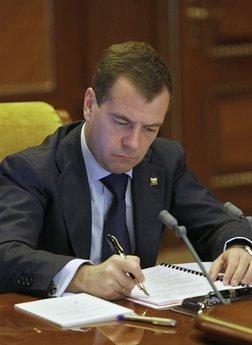Global General
Medvedev to tour Silicon Valley, seek investors
(Agencies)
Updated: 2010-06-23 09:17
 |
Large Medium Small |
MOSCOW -- Russia's Dmitry Medvedev visits Silicon Valley for the first time on Wednesday, eager to reinvent his country's outmoded, oil-dependent economy -- and lure talent and money from the high-tech capital.
Two years into his presidency, the 44-year-old is strenuously pursuing the creation of Russia's own Silicon Valley outside Moscow.
|
 President Dmitry Medvedev chairs a meeting at the Gorki presidential residence outside Moscow, Monday, June 21, 2010. [Agencies] |
But to succeed, Medvedev knows he needs to attract some of the best minds and investors in the United States to a project that many Russian businessmen are already skeptical about.
While in California, Medvedev will meet Gov. Arnold Schwarzenegger and Twitter's founders, and give a speech at Stanford University. He will then fly to Washington to meet President Barack Obama, and from there the two will go to Toronto for the G8 and G20 summits.
But it is the front leg of the trip that has deep personal significance for Medvedev, who wants to refashion Russia from a raw materials supplier into a high-tech, intellectual oasis where innovation thrives.
Since the Soviet Union dissolved nearly two decades ago, thousands of Russia's brightest minds emigrated to work in scientific centers in the US, Britain and Israel. Now Russia's leadership wants to entice them back and keep ambitious minds at home.
In four months the Kremlin has lavished an "innograd" -- or innovation city -- project with budget allocations of hundreds of millions of dollars, attracted entrepreneurs and scientists, and last week in St. Petersburg secured a promise from Silicon Valley's own Cisco Systems Inc. to participate in the ambitious venture.
"I'm sure they will build everything that's needed, but I doubt there will be any innovations or ideas there because the government glosses over the details," said Yaroslav Petrichkovsky, director of Elvees, a microchip producer and safety systems designer. "Like in other cases, they decided everything by themselves."
The promise of immense state investments -- $500 million alone has been budgeted next year -- and unprecedented tax benefits have prompted many to dub Skolkovo an enormous black hole, considering that special tax zones in Russia often have been a magnet for murky capital while producing little value.



